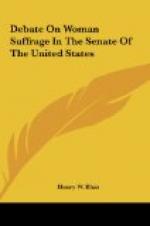to the States the right to decide by a majority
as to what banks they shall have, what laws they
shall enact with regard to insurance, with regard to
property, and any other question; but I insist
upon it that the National Government should not
leave it a question with the States that a majority
in any State may disfranchise the minority under any
circumstances whatsoever. The franchise to you
men is not secure. You hold it to-day, to
be sure, by the common consent of white men, but
if at any time, on your principle of government, the
majority of any of the States should choose to amend
the State constitution so as to disfranchise this
or that portion of the white men by making this
or that condition, by all the decisions of the
Supreme Court and by the legislation thus far there
is nothing to hinder them.
Therefore the women demand a sixteenth amendment to bring to women the right to vote, or if you please to confer upon women their right to vote, to protect them in it, and to secure men in their right, because you are not secure.
I would let the States act upon almost every other question by majorities, except the power to say whether my opinion shall be counted. I insist upon it that no State shall decide that question.
Then the popular-vote method is an impracticable thing. We tried to get negro suffrage by the popular vote, as you will remember. Senator Thurman will remember that in Ohio the Republicans submitted the question in 1867, and with all the prestige of the national Republican party and of the State party, when every influence that could be brought by the power and the patronage of the party in power was brought to bear, yet negro suffrage ran behind the regular Republican ticket 40,000.
It was tried in Kansas, it was tried in New York, and everywhere that it was submitted the question was voted down overwhelmingly. Just so we tried to get women suffrage by the popular-vote method in Kansas in 1867, in Michigan in 1874, in Colorado in 1877, and in each case the result was precisely the same, the ratio of the vote standing one-third for women suffrage and two-thirds against women suffrage. If we were to canvass State after State we should get no better vote than that. Why? Because the question of the enfranchisement of women is a question of government, a question of philosophy, of understanding, of great fundamental principle, and the masses of the hard-working people of this nation, men and women, do not think upon principles. They can only think on the one eternal struggle wherewithal to be fed, to be clothed, and to be sheltered. Therefore I ask you not to compel us to have this question settled by what you term the popular-vote method.
Let me illustrate by Colorado, the most recent State, in the election of 1877. I am happy to say to you that I have canvassed three States for this question. If Senator Chandler




